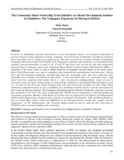Please use this identifier to cite or link to this item:
https://cris.library.msu.ac.zw//handle/11408/1051| Title: | The community share ownership trust initiative as a rural development solution in Zimbabwe: the Tongogara experience in Shurugwi district | Authors: | Matsa, Mark Masimbiti, Tatenda |
Keywords: | Tongogara growth point, Unki Community trust, Indigenization, community livelihoods |
Issue Date: | 2014 | Publisher: | Center for Promoting Ideas | Series/Report no.: | International Journal of Humanities and Social Science;Vol. 4, No. 8(1); p. 151-163 | Abstract: | In answer to debilitating sanctions and paralysis of rural development amid a rich geological endowment of precious minerals being siphoned by foreign companies, the Government of Zimbabwe introduced community share-ownership trusts as a panacea to rural poverty. The study assessed socio-economic benefits of Tongogara Community Share Ownership Trust (TCSOT) to the Tongogara community. Questionnaires were distributed to 64 randomly selected households in wards 8, 10, 12 and 14. Interviews were carried out with three purposively selected Chiefs in Shurugwi rural areas, Tongogara Rural District Council Acting Chief Executive Officer, 4 councilors in the target wards as well as village heads for 16 randomly selected villages in the target wards. Direct Field Observations were used to complement data obtained from questionnaires and interviews. Results show that the Tongogara community generally appreciate the programme since they have witnessed some noticeable socio-economic development in their areas. A classroom block with two classrooms and a staff house have been completed while another block is under construction at Banga primary school in ward 8. A mortuary and a pre-natal waiting shelter are both nearing completion at Zvamabande Rural Hospital in ward 10. In ward 14, the Trust has rebuilt Chirume Dam wall and solved water problems at Svika Clinic. Road maintenance and improvement of water availability were identified as district priority needs for development in most wards of Shurugwi District. The Tongogara-Chachacha and the Pakame-Chachacha roads have however been graveled by the Trust. The study recommends that TCSOT involve communities in decision-making and programme operations. Members of the Board of Trustees must be appointed by the Ministry of Indigenization and Economic Empowerment, basing on their expertise in community development. Other qualifying businesses such as Todal Mine, Falcon Gold and ZIMASCO, in the Shurugwi District should also comply with the requirements of the Indigenization and Economic Empowerment Act and set aside the 10% seed money to TCSOT in order to increase benefits to the community. | URI: | http://hdl.handle.net/11408/1051 |
| Appears in Collections: | Research Papers |
Show full item record
Page view(s)
248
checked on Jan 30, 2026
Download(s)
66
checked on Jan 30, 2026
Google ScholarTM
Check
Items in MSUIR are protected by copyright, with all rights reserved, unless otherwise indicated.




